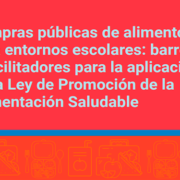The hidden deception of the industry behind food labeling
“Below, we offer a google translate version of the original article in Spanish. This translation may not be accurate but serves as a general presentation of the article. For more accurate information, please switch to the Spanish version of the website. In addition, feel free to directly contact in English the person mentioned at the bottom of this article with regards to this topic”
In our country, overweight and childhood obesity constitute a public health problem of great magnitude. This was corroborated by the World School Health Survey which showed that in Argentina overweight in adolescents aged 13 to 15 years increased from 24.5% to 28.6% between 2007 and 2012. Likewise, the results of the National Nutrition Survey and Health reported an obesity prevalence of 10.4% in children from 6 months to 6 years of age.
In this context, FUNDEPS participated in an investigation together with the Inter-American Federation of the Argentine Heart (FIC) and the Catholic University of Santa Fe in which the labeling of foods, claims and marketing strategies in various products of our country was analyzed.
After examining 301 products, the research showed that 87% of breakfast cereals, desserts and sweet cookies contain an excessive amount of one or more critical nutrients such as sodium, free sugars or fats. Likewise, 4 out of 10 containers of cereals, desserts and cookies of low nutritional quality use nutrition messages such as “Source of vitamins and minerals” or “50% of recommended daily calcium”.
On the other hand, it was determined that the current regulations related to food labeling and marketing techniques in our country are ineffective in adequately regulating this matter, which leaves an important margin for companies to take advantage of these legal gaps, confusing the consumer and limit in your choices. In this way, the State fails to comply with its obligation to protect the human right to health, which requires preventing the actions of third parties from affecting the possibility that a group of people can effectively exercise their right to health.
This situation demonstrates the need to strengthen the existing regulation and the implementation of effective mechanisms aimed at restricting these deceptive marketing practices and developing a nutritional labeling that provides the necessary information to ensure the right of consumers to clear and truthful information, contributing to the choice of healthier options. In this way, in addition, the State will adequately fulfill its obligations in relation to human rights to health and adequate food.
More information
– Description and analysis of the Argentine regulatory framework and international standards
– Full report
Contact
Slavenska Zec – slavenska.zec@fundeps.org








